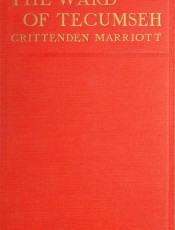we know that our senses are subject to decay, that from our middle years they are decaying all the time; but happily it is as if we didn't know and didn't believe. the process is too gradual to trouble us; we can only say, at fifty or sixty or seventy, that it is doubtless the case that we can't see as far or as well, or hear or smell as sharply, as we did a decade ago, but that we don't notice the difference. lately i met an extreme case, that of a man well past seventy who did not appear to know that his senses had faded at all. he noticed that the world was not what it had been to him, as it had appeared, for example, when he was a plough-boy, the time of his life he remembered most vividly, but it was not the fault of his senses; the mirror was all right, it was the world that had grown dim. i found him at the gate where i was accustomed to go of an evening to watch the sun set over the sea of yellow corn and the high green elms beyond, which divide the cornfields from the maidenhead thicket. an old agricultural labourer, he had a grey face and grey hair and throat-beard; he stooped a good deal, and struck me as being very feeble and long past work. but he told me that he still did some work in the fields. the older farmers who had employed him for many years past gave him a little to do; he also had his old-age pension, and his children helped to keep him in comfort. he was quite well off, he said, compared to many. there was a subdued and sombre cheerfulness in him, and when i questioned him about his early life, he talked very freely in his slow old peasant way. he was born in a village in the vale of aylesbury, and began work as a ploughboy on a very big farm. he had a good master and was well fed, the food being bacon, vegetables, and homemade bread, also suet pudding three times a week. but what he remembered best was a rice pudding which came by chance in his way during his first year on the farm. there was some of the pudding left in a dish after the family had dined, and the farmer said to his wife, "give it to the boy"; so he had it, and never tasted anything so nice in all his life. how he enjoyed that pudding! he remembered it now as if it had been yesterday, though it was sixty-five years ago.
he then went on to talk of the changes that had been going on in the world since that happy time; but the greatest change of all was in the appearance of things. he had had a hard life, and the hardest time was when he was a ploughboy and had to work so hard that he was tired to death at the end of every day; yet at four o'clock in the morning he was ready and glad to get up and go out to work all day again because everything looked so bright, and it made him happy just to look up at the sky and listen to the birds. in those days there were larks. the number of larks was wonderful; the sound of their singing filled the whole air. he didn't want any greater happiness than to hear them singing over his head. a few days ago, not more than half a mile from where we were standing, he was crossing a field when a lark got up singing near him and went singing over his head. he stopped to listen and said to himself, "well now, that do remind me of old times!"
"for you know," he went on, "it is a rare thing to hear a lark now. what's become of all the birds i used to see i don't know. i remember there was a very pretty bird at that time called the yellow-hammer—a bird all a shining yellow, the prettiest of all the birds." he never saw nor heard that bird now, he assured me.
that was how the old man talked, and i never told him that yellow hammers could be seen and heard all day long anywhere on the common beyond the green wall of the elms, and that a lark was singing loudly high up over our heads while he was talking of the larks he had listened to sixty-five years ago in the vale of aylesbury, and saying that it was a rare thing to hear that bird now.
